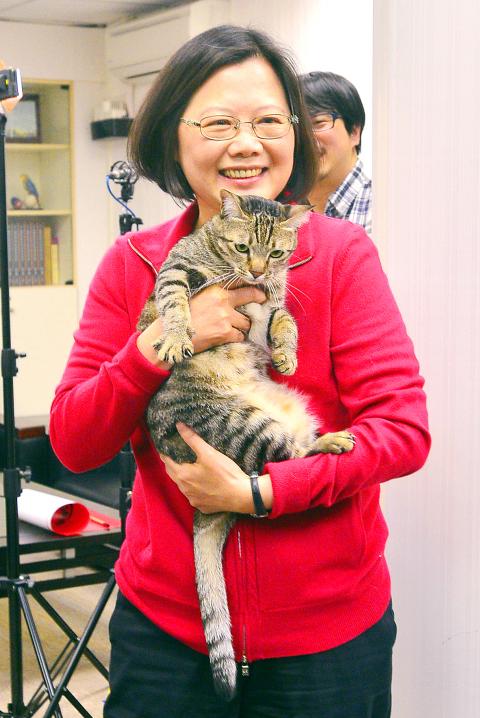Democratic Progressive Party (DPP) Chairperson Tsai Ing-wen (蔡英文) yesterday announced that she would join the party’s primary for the presidential election next year.
“I have decided to join the DPP’s primary for president,” Tsai said on Facebook. “I have my dreams; I have my determination. I believe that resolute implementation of policies needs to be backed by calm thought.”
“Breaking through difficulties requires a strong will,” she said. “The nation needs reform, but pain will certainly accompany it; therefore I will unite with social forces and together we will solve the challenges the nation faces in a steady manner.”

Photo: Wang Yi-sung, Taipei Times
Tsai said that she does not mean to take Taiwan into “an age of the DPP or an age of Tsai.”
She said she would instead create an age that belongs to the public, an “age of [a] new politics of transparency, honesty, public participation, tolerance, clear division of power and responsibility, as well as firm protection of national sovereignty,” she said.
Tsai spoke of how she took over party leadership in 2008, when the DPP was facing its most difficult time, and resumed party leadership last year, after the Sunflower movement, when “party politics” became a negative term in the eyes of many.
She said she is focused on keeping the DPP vital and a good option in the political market.
Tsai said that the government should not just sit aside and watch people struggle to survive on their own and suffer under the leadership of President Ma Ying-jeou (馬英九), adding that this was why she decided to run for president again.
Tsai’s office announced that she would register at 11am today as a candidate in the party primary.
Tainan Mayor William Lai (賴清德) and former DPP chairman Su Tseng-chang (蘇貞昌), who were both considered likely to enter the primary before announcing they would not, sent Tsai messages wishing her luck.

Intelligence agents have recorded 510,000 instances of “controversial information” being spread online by the Chinese Communist Party (CCP) so far this year, the National Security Bureau (NSB) said in a report yesterday, as it warned of artificial intelligence (AI) being employed to generate destabilizing misinformation. The bureau submitted a written report to the Legislative Yuan in preparation for National Security Bureau Director-General Tsai Ming-yen’s (蔡明彥) appearance before the Foreign Affairs and National Defense Committee today. The CCP has been using cognitive warfare to divide Taiwanese society by commenting on controversial issues such as Taiwan Semiconductor Manufacturing Co’s (TSMC, 台積電) investments in the

HELPING HAND: The steering committee of the National Stabilization Fund is expected to hold a meeting to discuss how and when to utilize the fund to help buffer the sell-off The TAIEX plunged 2,065.87 points, or 9.7 percent, to close at 19,232.35 yesterday, the highest single-day percentage loss on record, as investors braced for US President Donald Trump’s tariffs after an extended holiday weekend. Amid the pessimistic atmosphere, 945 listed companies led by large-cap stocks — including Taiwan Semiconductor Manufacturing Co (TSMC, 台積電), Hon Hai Precision Industry Co (鴻海精密) and Largan Precision Co (大立光) — fell by the daily maximum of 10 percent at the close, Taiwan Stock Exchange data showed. The number of listed companies ending limit-down set a new record, the exchange said. The TAIEX plunged by daily maxiumu in just

‘COMPREHENSIVE PLAN’: Lin Chia-lung said that the government was ready to talk about a variety of issues, including investment in and purchases from the US The National Stabilization Fund (NSF) yesterday announced that it would step in to staunch stock market losses for the ninth time in the nation’s history. An NSF board meeting, originally scheduled for Monday next week, was moved to yesterday after stocks plummeted in the wake of US President Donald Trump’s announcement of 32 percent tariffs on Taiwan on Wednesday last week. Board members voted to support the stock market with the NT$500 billion (US$15.15 billion) fund, with injections of funds to begin as soon as today. The NSF in 2000 injected NT$120 billion to stabilize stocks, the most ever. The lowest amount it

NEGOTIATIONS: Taiwan has good relations with Washington and the outlook for the negotiations looks promising, Minister of Economic Affairs J.W. Kuo said Taiwan’s GDP growth this year is expected to decrease by 0.43 to 1.61 percentage points due to the effects of US tariffs, National Development Council (NDC) Minister Paul Liu (劉鏡清) said at a meeting of the legislature’s Economics Committee in Taipei yesterday, citing a preliminary estimate by a private research institution. Taiwan’s economy would be significantly affected by the 32 percent “reciprocal” tariffs slapped by the US, which took effect yesterday, Liu said, adding that GDP growth could fall below 3 percent and potentially even dip below 2 percent to 1.53 percent this year. The council has commissioned another institution